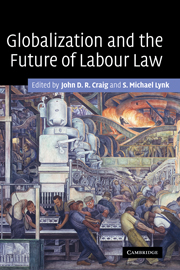Book contents
- Frontmatter
- Contents
- Notes on contributors
- Acknowledgements
- Table of cases
- List of abbreviations
- Introduction
- PART I Perspectives on globalization
- PART II International labour standards
- PART III The European Union
- 6 Industrial relations and EU enlargement
- 7 Trends and challenges of labour law in Central Europe
- 8 Labour market integration: lessons from the European Union
- PART IV The Americas
- PART V The ILO
- PART VI Labour rights
- Bibliography
- Index
7 - Trends and challenges of labour law in Central Europe
Published online by Cambridge University Press: 23 July 2009
- Frontmatter
- Contents
- Notes on contributors
- Acknowledgements
- Table of cases
- List of abbreviations
- Introduction
- PART I Perspectives on globalization
- PART II International labour standards
- PART III The European Union
- 6 Industrial relations and EU enlargement
- 7 Trends and challenges of labour law in Central Europe
- 8 Labour market integration: lessons from the European Union
- PART IV The Americas
- PART V The ILO
- PART VI Labour rights
- Bibliography
- Index
Summary
Introduction
This paper considers the evolution of labour laws in ten Central European countries since they abandoned communist rule at the beginning of the last decade. In alphabetical order these countries are Bulgaria, Czech Republic, Estonia, Hungary, Latvia, Lithuania, Poland, Romania, Slovakia, and Slovenia. In the aftermath of the downfall of communism, all ten countries shared common goals of establishing political democracy, developing a market economy and eventually joining the European Union. In the early 1990s, each applied for EU membership. At its meeting in Copenhagen in 1993, the Council of the European Union decided to welcome their candidatures provided that the EU was satisfied that the applicant countries fulfilled the following criteria (commonly referred to as the “Criteria of Copenhagen”):
Political criteria: stability of institutions guaranteeing democracy, the rule of law, human rights and respect for and protection of minorities;
Economic criteria: a functioning market economy as well as the capacity to cope with competitive pressure and market forces within the Union;
Institutional criteria: the ability to take on the obligations of membership including adherence to the aims of political, economic and monetary union, and the transposition of the acquis communautaire into the national law.
Substantial Community assistance was placed at the disposal of the candidate countries to help them build the capacity required to meet the Criteria of Copenhagen, and the European Commission regularly monitored and assessed their progress.
- Type
- Chapter
- Information
- Globalization and the Future of Labour Law , pp. 191 - 224Publisher: Cambridge University PressPrint publication year: 2006
- 1
- Cited by



